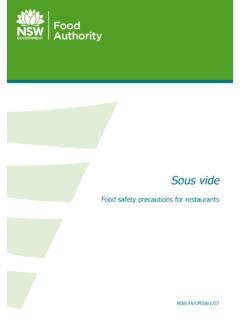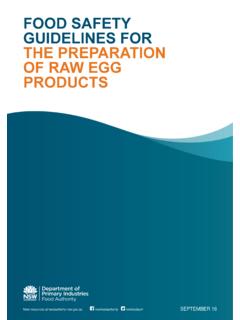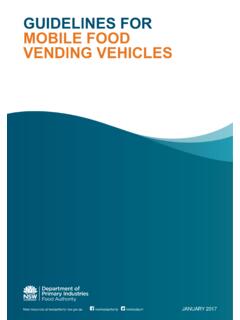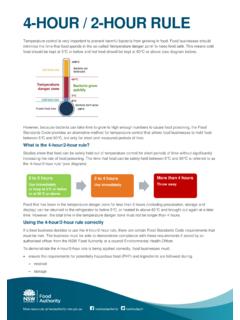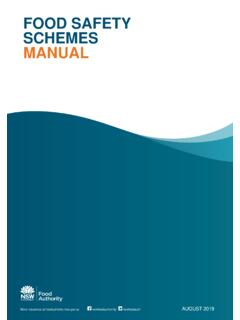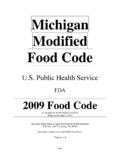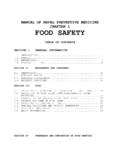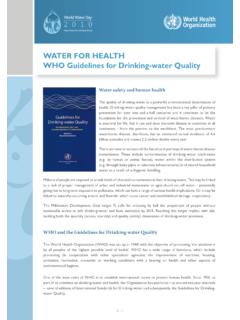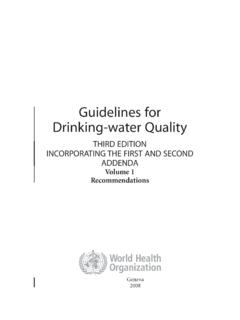Transcription of GUIDELINES FOR FOOD BUSINESSES AT …
1 More resources at nswfoodauthority nswfoodauth JUNE 2016 GUIDELINES FOR food BUSINESSES AT temporary events 2 More resources at nswfoodauthority nswfoodauth Contents Introduction .. 4 What is a temporary event? .. 4 Obligations on selling food .. 4 Charities and community 5 6 Notification .. 6 Licensing .. 6 Council approvals .. 6 food Safety Supervisor .. 7 Inspections .. 7 Fees and charges .. 7 Conditions of operation .. 9 Location of food stalls .. 9 Toilets .. 9 Maintenance .. 9 Garbage and recyclable matter.
2 9 Animals and pests .. 9 Children in food stalls .. 9 Water and ice .. 10 Facilities .. 11 Construction of temporary food stalls .. 11 Fixtures .. 11 Cleaning, sanitising and hand washing facilities .. 11 Waste disposal .. 12 food handling .. 13 food suppliers .. 13 Preparing food at home .. 13 Transport of food to events .. 13 food storage .. 13 Potentially hazardous foods and temperature control .. 14 Cross contamination .. 15 food display .. 15 3 More resources at nswfoodauthority nswfoodauth Crockery, wrappings and packaging.
3 15 Single-use items .. 15 Skills and knowledge .. 15 food Safety Supervisor .. 16 Staff illness .. 16 Requirements for food handlers .. 16 Hand 17 Money handling/touching customers hands when serving food .. 17 Cleaning and sanitising .. 17 Labelling .. 17 Electricity and gas supplies, fire extinguishers and work safety .. 20 Pollution prevention .. 20 temporary food stall layout .. 21 temporary food stall checklist .. 22 Contact information .. 24 Key definitions .. 25 4 More resources at nswfoodauthority nswfoodauth Introduction These GUIDELINES inform BUSINESSES selling food at temporary events in NSW of their legal requirements in relation to the NSW food Act 2003 (the Act) and the food Standard Code (the Code).
4 They provide information on basic requirements such as power supply and waste disposal, and suggest ways to maintain food safety at the event. BUSINESSES and local council environmental health officers (EHOs) can use this guide to assess compliance with the Act and the Code. This document details legal requirements for food BUSINESSES and provides guidance on food safety at temporary events . This guideline also provides BUSINESSES with a guide to applicable fees and charges that councils may levy. food BUSINESSES wishing to sell food at temporary events should contact the council where the event is based prior to operating to check if a permit to trade on public land is required, if an inspection must be completed, if there are any applicable fees and/or if there any other requirements.
5 What is a temporary event? A temporary event is any occasion which is of limited duration or periodic in nature and where food is sold to consumers from a temporary structure or vehicle. Examples include fairs, festivals, markets and shows. These GUIDELINES cover all types of food BUSINESSES at temporary events and provide guidance for additional requirements when the temporary event continues over several days introducing additional risks. The checklist provided within the document can be used to self-assess compliance with general requirements.
6 While mobile food vending vehicles often operate at temporary events , it is recommended that they refer to the food Authority document GUIDELINES for mobile food vending vehicles. Obligations on selling food A person handling or selling food or operating stalls used for selling food for human consumption, including drinks, produce, fruit and vegetables or pre-packaged food , is deemed to be a food business . This includes not-for-profit operations. A food business is required to sell safe and suitable food in accordance with the NSW food Act 2003 (the Act), which also mandates compliance with the national food Standards Code (the Code).
7 Of particular relevance for temporary events are parts (labelling) and , and ( food safety standards) of the Code, which can be accessed at Failure to comply with the requirements may lead to enforcement action. Depending on the food safety risk identified, this action may include a warning letter, improvement notice, penalty notice, seizure, prohibition or prosecution. The NSW food Authority (the food Authority) and councils generally follow an escalating enforcement policy. 5 More resources at nswfoodauthority nswfoodauth Charities and community groups Charities and community groups are those which do not derive funds for personal financial gain, but direct any profits back to the community ( local sports clubs, Lions and Rotary clubs).
8 The food Act 2003 (NSW) and food Standards Code apply to all food BUSINESSES including those selling food for charity or community purposes. It is always an offence to sell food that is unsafe or unsuitable. Charities and community groups are exempt from some requirements: Notification of food business is not required if food sold is not potentially hazardous ( scones) or is to be consumed immediately after thorough cooking ( sausage sizzle) food Safety Supervisor requirements do not apply Some labelling requirements do not apply; however it is a requirement to provide information to customers on request about these allergenic ingredients: cereals containing gluten crustacean and their products fish and fish products egg and egg products milk and milk products peanuts and peanut products sesame seeds and sesame seed products soybean and soybean products tree nuts and tree nut products Further information can be obtained from the NSW food Authority or local councils.
9 6 More resources at nswfoodauthority nswfoodauth Administration Notification food BUSINESSES that trade at temporary events must ensure that their details have been notified to their local council prior to commencing trading for the first time. BUSINESSES should notify the council where the majority of their trade is undertaken, or where they are based if they do not trade in a regular location or the council where the event is being held. Notification is a compulsory requirement. Appropriate details for notification include: contact details for the food business including the name of the food business and the name and business address of the proprietor of the food business, the nature of the food business, and the location of all food premises of the food business that are within the jurisdiction of the enforcement agency.
10 Notification may be made to council in any form that includes the above details. The only exceptions are: BUSINESSES licensed or notified with the NSW food Authority, or not-for-profit fundraising events where there is sale of low risk food ( tea/coffee and biscuits) or sale of food that is thoroughly cooked immediately before consumption ( sausage sizzle). Notification is a one-off process unless your details change, in which case you are required to provide an update to the appropriate authority. Licensing Some retailers at temporary events require a food Authority licence if there is an activity that requires a licence in the business, such as.
